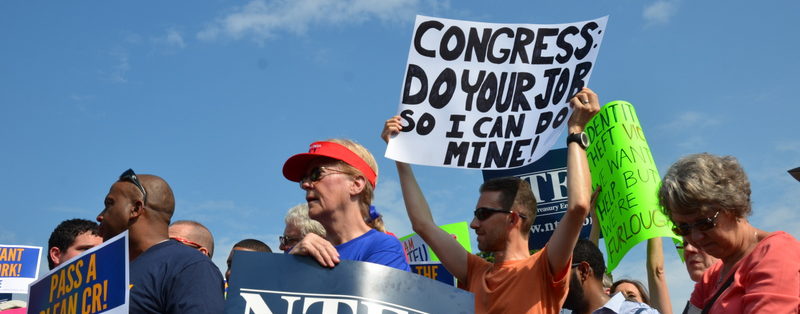Slider image by Wikimedia Commons.
This Friday is Feb. 15, barely two and a half weeks since the government reopened on Jan. 25. President Donald Trump stated that although a deal to keep the government open has more than likely been reached between democratic and republican congressional leaders, he is not happy with it, as it does not include the money he demanded for the border wall. According to the New York Time, Trump said he will achieve it by “other methods,” and this leads us to wonder whether another federal shutdown will occur as early as this Friday.
On Dec. 21, when Trump’s funding for building a wall between the United States and Mexico was not approved, the U.S. government began a partial shut down. After over one month, the longest shutdown in U.S. history, the government reopened on Jan. 25. Both political parties tried to make compromises in what seemed like a never ending debate. The shutdown didn’t just affect the powerful in Washington D.C. It affected the people who work all over the country: our neighbors, family, and friends.
The idea for a wall on the southern U.S. border was first proposed during Trump’s run for president. He proposed the construction of a continuous wall on the border between U.S. and Mexico, which would require around $18-$20 billion dollars over 10 years. Originally, Trump was insistent that Mexico would pay for the wall. However, the President of Mexico has refused on multiple occasions to pay for it. So as Trump began to realize that Mexico would not fund the wall, he decided that America would dish out the money. The problem is, that is an outrageous amount of cash. Spending this much at one time would hurt the economy for years to come. So the shutdown began.
In the beginning of the shutdown, over 380,000 employees were sent home without pay. A few weeks later, the Trump administration demanded that 50,000 of them come back to work, still without getting paid. Yet workers have bills to pay and food to buy, so going without pay for over a month was a major problem. Many began to look for part-time jobs, some even quitting their government job altogether.
On Jan. 11, 2019, Congress passed a bill to reimburse federal employees for lost wages. While this sounds good, it does not make up for the fact that for over a month these federal employees may not have had the money to keep paying their rent or support their families. In other words, the damage had already been done.
Serena Klausner, an employee at the Identity Theft Victim Assistance Department (IDTVA) for the IRS, says that the shutdown caused a lot of stress because she did not “[know] when it would end, if [she] would get called back to work without getting paid, and how [she] would be able to pay for living expenses.”

The effects of this shutdown were innumerable. The percentage of people being furloughed created problems that could be potentially irreversible. TSA workers were calling in sick and eventually quit their jobs, causing security lines to increase as airports attempted to manage the same number of flights with significantly fewer employees. Additionally, the FBI lost resources and funding, noting that this shutdown has impacted their work on counter-terrorism and intelligence, as well as delaying certain time sensitive investigations. National Parks and other monuments remained open with inadequate staff to protect them, resulting in vandalism and waste that could take over 300 years to remedy.
The people who have suffered the most following this shutdown are not the powerful members of Congress. It was the people who live paycheck to paycheck and were forced to find second jobs to support their families because of an issue they did nothing to provoke. The shutdown has made lasting impacts on individuals and the nation as a whole, all because Trump did not get the money he wanted to build a wall that would cost America more than $4 billion a year.
And the worst part is: it’s not over yet. The reopening of the government is only for the time being. If Trump decides he is not happy with the deal that has been spoken about, there is no telling what could happen next. Congress is beginning to come up with ideas for new bills that would ensure the government remain open even if they can not come to a decision. Actions need to be taken quickly because employees of the government cannot go another month without pay.
According to Klausner, “the only way the shutdown will end is if the President, Congress, and the House all agree on a budget” for the government next year. If this is to happen, compromises must be made by all parties. The longest government shutdown in U.S. history came to a close, but if the legislation is not signed by the President, then a nation is left to wonder whether another one is on the horizon.
———————————————————————-
*The views and opinions expressed in this article are those of the author and do not necessarily reflect the official policy or position of Rampagewired or Hyman Brand Hebrew Academy*
















































































